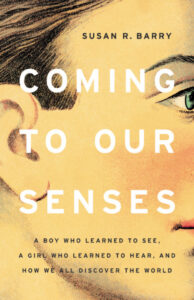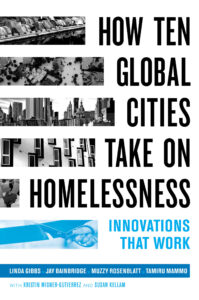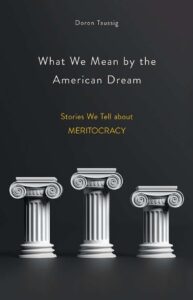“You Just Have to Read This. . .” Books by Wesleyan Authors Barry ’76, Rosenblatt ’87, and Taussig ‘03
In this continuing series, Annie Roach ’22, an English and Italian studies major from Northampton, Mass., reviews alumni books and offers a selection for those in search of knowledge, insight, and inspiration. The volumes, sent to us by alumni, are forwarded to Olin Library as donations to the University’s collection and made available to the Wesleyan community.
 Susan R. Barry ’76, Coming to Our Senses: A Boy Who Learned to See, a Girl Who Learned to Hear, and How We All Discover the World (Basic Books, 2021)
Susan R. Barry ’76, Coming to Our Senses: A Boy Who Learned to See, a Girl Who Learned to Hear, and How We All Discover the World (Basic Books, 2021)
What is it like to gain a sense—say, sight or hearing—after spending your whole life without it? Is the transition seamless or disorienting? What can it teach us about the concept of human perception? Susan R. Barry explores these questions and more in Coming to Our Senses: A Boy Who Learned to See, a Girl Who Learned to Hear, and How We All Discover the World. The book focuses on two individuals who have experienced the aforementioned phenomenon: Liam McCoy, who was blind since infancy and then gained the ability to see after several operations when he was 15 years old; and Zohra Damji, who was deaf until receiving a cochlear implant at the age of 12. Liam and Zohra belong to a small group of people who have adjusted successfully to their new senses, albeit with lots of challenges.
Barry, who spent over a decade getting to know these two incredible people, profiles them with detail and compassion, unraveling their stories through both personal and scientific lenses. The result is a book that reveals the ways in which scientific knowledge is profoundly tied to our understanding of human nature. Neither scientists nor humanities-oriented readers will be left out of the intrigue of Barry’s fascinating prose.
Susan R. Barry is professor emeritus of biological sciences at Mount Holyoke College, specializing in stereovision (the perception of three-dimensionality) and neuronal plasticity. As a young child, she became cross-eyed and stereoblind, only to later—at the age of nearly 50—gain the ability to see in stereo depth, an astonishing development that challenged scientists’ previous conceptions of how the human brain works. Her first book, Fixing My Gaze: A Scientist’s Journey into Seeing in Three Dimensions, tells this story. Coming to Our Senses is her second book.
 Linda Gibbs, Jay Bainbridge, Muzzy Rosenblatt ’87, Tamiru Mammo, How Ten Global Cities Take on Homelessness (University of California Press, 2021)
Linda Gibbs, Jay Bainbridge, Muzzy Rosenblatt ’87, Tamiru Mammo, How Ten Global Cities Take on Homelessness (University of California Press, 2021)
Written by four qualified and passionate authors, including Muzzy Rosenblatt ’87, How Ten Global Cities Take on Homelessness is a readable and urgent book that profiles 10 different cities around the world and their respective approaches to homelessness. Not all of the 10 homeless populations are considered high; however, each city has demonstrated sustained effort and energy in combatting homelessness. The authors use these cities as case studies, drawing on both successful and unsuccessful strategies governments have taken to address the concern, to illuminate the fact that homelessness is not an unsolvable issue.
The book features compelling statistics and concrete research, but also taps into the emotional and social elements of the topic, exploring the public’s perception of and reactions to homeless people. The book includes personal blurbs and anecdotes from each of the authors. In one section, Rosenblatt describes his own journey toward doing his current work and explains why it is so important to him: “We will succeed in ending homelessness only when we stop seeing people as problems, and instead focus on who they are, why they are in these situations, and how we can serve them better.” Indeed, the authors’ passion prompts readers to feel the same.
Muzzy Rosenblatt is the CEO and president of Bowery Residents’ Committee, a nonprofit organization in New York City that provides housing and services to thousands of people in need, helping to break the cycle of homelessness.
 Doron Taussig ’03, What We Mean By the American Dream: Stories We Tell About Meritocracy (Cornell University Press, 2021)
Doron Taussig ’03, What We Mean By the American Dream: Stories We Tell About Meritocracy (Cornell University Press, 2021)
The term “American Dream”—and all of the history and significance that comes with it—is ubiquitous in the United States and abroad, encapsulating the belief that no matter what type of situation you were born into, upward mobility and merit can be “earned” through hard work alone. More and more, however, this idea has been challenged as the reality of inequality in the country has become starker in recent years. In his book What We Mean By the American Dream: Stories We Tell About Meritocracy, Doron Taussig joins the chorus of skeptics and provides a fresh perspective on the real significance of the American Dream, which he dubs a “mythology” rather than a truth.
A former journalist, Taussig demonstrates his reporting skills through a multitude of interviews with a diverse group of Americans from different backgrounds, careers, financial situations, and aspirations. The anecdotal prose works well to cut to the core of Taussig’s project, with the carefully told stories enabling readers to feel like they know the interviewees personally. The book is well-suited to both American and non-American readers who are looking to better understand the complicated and nuanced truth of how one “makes it” or doesn’t in the United States.
Doron Taussig is a professor in the media and communication studies department at Ursinus College and a fellow with the Tow Center for Digital Journalism at Columbia University. He was previously a journalist at the Philadelphia City Paper and the Philadelphia Daily News. What We Mean By the American Dream is his first book. He lives in Philadelphia.

